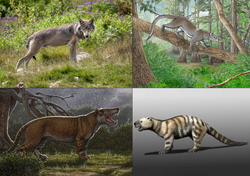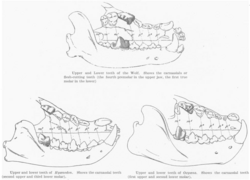Biology:Pan-Carnivora
| Pan-Carnivora | |
|---|---|

| |
| Scientific classification | |
| Domain: | Eukaryota |
| Kingdom: | Animalia |
| Phylum: | Chordata |
| Class: | Mammalia |
| Mirorder: | Ferae |
| Clade: | Pan-Carnivora Flynn, Wyss & Wolsan, 2020[1] |
| Subgroups | |
| |
Pan-Carnivora ("all carnivorans") is a clade of mammals from mirorder Ferae, consisting of the clade Carnivoramorpha, extinct orders Hyaenodonta and Oxyaenodonta, and extinct genera Altacreodus and Tinerhodon.
Anatomy

The common feature for members of this clade is the presence of the carnassial teeth. This feature allows distinguishing the Carnivoramorpha, Oxyaenodonta and Hyaenodonta from the other carnivorous placental mammals.[2] However, these mammals are distinguished between them self based on the position of the carnassial teeth and the number of molars. The carnassial teeth of the Carnivoramorpha are located in P4 and m1, in Oxyaenodonta are M1 and m2, and in Hyaenodonta are M2 and m3. This appears to be a case of a possible evolutionary convergent adaptation toward similar diet.
Classification and phylogeny
Classification
- Clade: Pan-Carnivora
- Clade: Carnivoramorpha
- Order: †Hyaenodonta
- Order: †Oxyaenodonta
- (unranked): †Altacreodus/Tinerhodon clade
- Genus: †Altacreodus
- Genus: †Tinerhodon
Phylogenetic tree
The phylogenetic relationships of Pan-Carnivora are shown in the following cladogram:[3][4][5][6][7][8][9]
| Ferae |
| ||||||||||||||||||||||||||||||||||
See also
References
- ↑ J. J. Flynn, A. R. Wyss and M. Wolsan (2020.) "Pan-Carnivora, new clade name" In book: Phylonyms (pp.979-982)
- ↑ Floréal Solé & Thierry Smith (2013.) "Dispersals of placental carnivorous mammals (Carnivoramorpha, Oxyaenodonta & Hyaenodontida) near the Paleocene-Eocene boundary: a climatic and almost worldwide story" Geologica Belgica 16/4: 254-261
- ↑ "Phylogenetic Nomenclature of Carnivoran Mammals.". http://www.ohiou.edu/phylocode/IPNM.pdf.
- ↑ Flynn, John J.; Finarelli, John A.; Spaulding, Michelle (2010). "Phylogeny of the Carnivora and Carnivoramorpha, and the use of the fossil record to enhance understanding of evolutionary transformations". Carnivoran evolution. New views on phylogeny, form and function. Cambridge University Press. pp. 25–63. doi:10.1017/CBO9781139193436.003. ISBN 9781139193436.
- ↑ Michelle Spaulding; John J. Flynn; Richard K. Stucky (2010). "A new basal Carnivoramorphan (Mammalia) from the 'Bridger B' (Black's Fork member, Bridger Formation, Bridgerian Nalma, middle Eocene) of Wyoming, USA". Palaeontology 53 (4): 815–832. doi:10.1111/j.1475-4983.2010.00963.x.
- ↑ Solé, Floréal; Smith, Richard; Coillot, Tiphaine; de Bast, Eric; Smith, Thierry (2014). "Dental and tarsal anatomy of Miacis latouri and a phylogenetic analysis of the earliest carnivoraforms (Mammalia, Carnivoramorpha)". Journal of Vertebrate Paleontology 34 (1): 1–21. doi:10.1080/02724634.2013.793195. ISSN 0272-4634.
- ↑ Solé, Floréal; Smith, Thierry; De Bast, Eric; Codrea, Vlad; Gheerbrant, Emmanuel (2016). "New carnivoraforms from the latest Paleocene of Europe and their bearing on the origin and radiation of Carnivoraformes (Carnivoramorpha, Mammalia)". Journal of Vertebrate Paleontology 36 (2): e1082480. doi:10.1080/02724634.2016.1082480. ISSN 0272-4634.
- ↑ Solé, Floréal; Ladevèze, Sandrine (2017). "Evolution of the hypercarnivorous dentition in mammals (Metatheria, Eutheria) and its bearing on the development of tribosphenic molars". Evolution & Development 19 (2): 56–68. doi:10.1111/ede.12219. PMID 28181377. https://onlinelibrary.wiley.com/doi/abs/10.1111/ede.12219.
- ↑ Prevosti, Francisco Juan; Forasiepi, Analia M. (2018), Prevosti, Francisco J.; Forasiepi, Analía M., eds., "Introduction" (in en), Evolution of South American Mammalian Predators During the Cenozoic: Paleobiogeographic and Paleoenvironmental Contingencies, Springer Geology (Cham: Springer International Publishing): pp. 1–16, doi:10.1007/978-3-319-03701-1_1, ISBN 978-3-319-03701-1, https://doi.org/10.1007/978-3-319-03701-1_1, retrieved 2022-01-05
Wikidata ☰ Q103010985 entry

